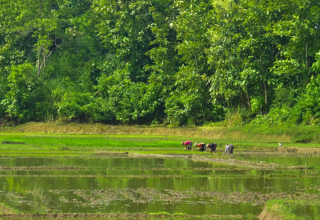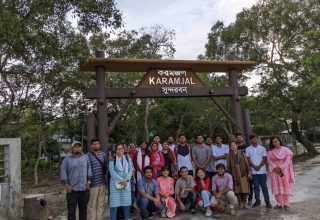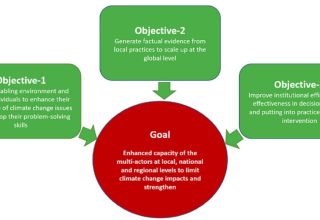Dr Saleemul Huq has participated in the international climate negotiations since their inception in 1992, and has been named among the ‘World’s 100 Most Influential People in Climate Policy for 2019’ for making a positive difference. In an interview with the Dhaka Tribune’s Syed Samiul Basher Anik, Dr Huq – director, International Centre for Climate Change and Development at the Independent University, Bangladesh – says Bangladesh, as one of the most climate vulnerable countries that is already seeing losses and damage due to climate change, needs to lead on this issue globally.
What are the effects of climate change in Bangladesh?
Bangladesh has been recognized for over a decade as being one of the world’s most climate vulnerable countries, due to its location on the delta of three major rivers and its dense and relatively poor population.
In recent years, we are seeing adverse climatic impacts that could be attributed, at least in part, to human induced climate change. The main impact is the salinization of the country’s coastal region.
You have been focusing on ‘loss and damage’ in climate change negotiations. Can you please give us a brief explanation on what it is, how it works, and how it can benefit countries like Bangladesh?
In the evolution of the climate change phenomenon over several decades, we have gone through several phases in our understanding.
The first phase was to focus on emissions of greenhouse gases, which causes global warming and hence try to reduce those emissions globally. We call this action mitigation.
Then in the second phase we realized that we were not reducing emissions fast enough and that a certain degree of global warming is now inevitable, and we have to prepare to deal with them. This is called adaptation.
Now we are entering the third phase which is happening because we have failed to make notable progress in the mitigation and adaptation phases. Thus we are beginning to see “loss and damage” due to human induced climate change in recent times.
We need to address this issue urgently, as Bangladesh is one of the most climate vulnerable countries and we are already seeing losses and damages due to climate change. We need to lead on this issue globally.
In context of Bangladesh, who can claim compensations for losses and damages?
At the moment, there is no agreed definition of what constitutes loss and damage from human induced climate change, nor is there any agreement on who should be compensated. Bangladesh has an opportunity to be proactive in developing such definitions and practice to share with the rest of the world.
Do you think there is a lack of climate change research in Bangladesh? If yes, how it is affecting the negotiations?
I would say that the level of climate change Research in Bangladesh is better than most countries and on some topics, such as loss and damage, we are in fact global leaders.
Just to give one example, we have a platform called Gobeshona (Bangla for “research”) with over sixty universities and research institutions, as well as a searchable database of well over two thousand scientific papers on climate change in Bangladesh (www.gobeshona.net).
In your point of view, how is the Bangladesh government working to fight the effects of climate change? Do you think the initiatives taken are enough?
The government of Bangladesh was the first country in the world to treat climate change with the seriousness it deserves.
Ten years ago the government prepared the Bangladesh Climate Change Strategy and Action Plan (BCCSAP), which identified six pillars and over forty actions. Then the government created the Bangladesh Climate Change Trust Fund (BCCTF) in which the finance minister has regularly put around hundred crore taka each year to fund hundreds of actions by the government, as well as non government organizations (NGOs).
So, both the government and the people of Bangladesh are far ahead of the rest of the world in recognizing the climate change issue, and are actively trying to tackle it. However these efforts are not nearly enough, because the problem is large and complex.
What will be your suggestion for policy makers to deal with the effects of climate change in the years ahead?
The government of Bangladesh is currently revising the BCCSAP for an extension to the year 2030, and this should be published soon. The main focus of going forward is to ensure that tackling climate change is effectively mainstreamed into our national, sectoral and local planning processes.
The other major change going forward is to shift from a whole-of-government approach to a whole-of-society approach, where all parts of the society need to become able and willing to tackle climate change.
You have been named as one of “The 100 Most Influential People in Climate Policy 2019”. What will be the priorities from your side to bring positive change in climate policies in the days ahead?
It is indeed a great honour and I hope that it will bring more global attention to Bangladesh, as not just a climate vulnerable country (which remains true) but as a country that is at the forefront of tackling the climate change problem, and is on its way to becoming a climate resilient country by 2030.
We are also happy to share our knowledge and learning with the rest of the world.
Originally this interview taken by Syed Samiul Basher Anik and published on March 20, 2019 at Dhaka Tribune









